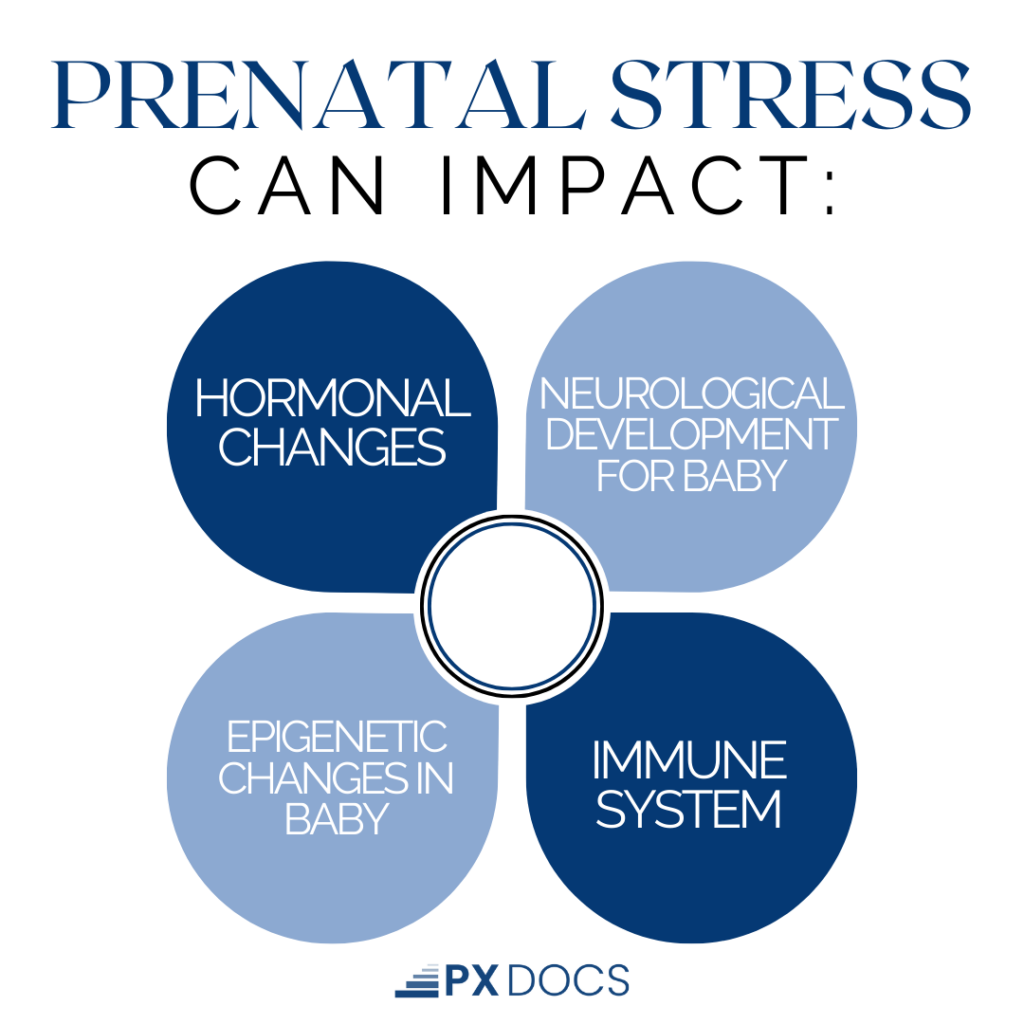Emotions flood in when we find out we’re pregnant. Whether it’s joy, surprise, heartbreak, nerves… so many changes! And not just those “I’m emotional because I’m pregnant” hormones that we all love to blame!
Let me tell you a little bit about Amber’s story and the prenatal stress she was under during her pregnancy.
Amber was very surprised when she and her husband saw that positive pregnancy test lying on the counter. In grad school, taking numerous tests a week and studying for her biggest national board exam yet, she was in the thick of being stressed out! Overwhelmed with so many emotions, including joy and nerves of the unknown, she didn’t know how they would possibly care for a baby at a time like this. That’s when she knew she had to be proactive and take care of all of the prenatal stress she was experiencing.
What is Prenatal Stress, and Why is it Concerning?
Just like Amber, many pregnant women are under loads of stress. But what does this have to do with anything, and should it be a concern?
Prenatal stress refers to the emotional and physiological stress experienced by a pregnant woman during her pregnancy. This stress can arise from various sources.
Prenatal stress is a significant concern because it can impact the health and development of both the expectant mother and the developing fetus.
Prenatal stress can cause a cascade of struggles, including but not limited to:
- Hormonal Changes: Prenatal stress activates the body’s stress response, leading to the release of stress hormones such as cortisol and adrenaline. While these hormones are essential for short-term stress responses, chronic exposure can be harmful.
- Immune System Impact: Prolonged stress can affect the immune system, potentially increasing the risk of infections or other health issues for the expectant mother.
- Neurological Development For Baby: The developing fetus is sensitive to the hormonal changes associated with maternal stress. Prenatal stress may influence the development of the fetal brain and nervous system.
- Epigenetic Changes on Baby: Stress during pregnancy can lead to epigenetic changes, which are alterations in gene expression that don’t involve changes to the underlying DNA sequence. These changes can affect the baby’s health and development.
- During pregnancy, there are a lot of changes that our bodies go through, and prenatal stress can have an impact on whether those are positive or negative. When stress lingers for too long, it can become dangerous and result in challenges such as:
- Preterm Birth: Prenatal stress has been associated with an increased risk of preterm birth, which can have health implications for the newborn.
- Low Birth Weight: High levels of stress during pregnancy may contribute to low birth weight in infants.
- Behavioral and Emotional Challenges: Children born to mothers who experienced prenatal stress may be at a higher risk of behavioral and emotional challenges.
- Long-Term Effects: Some research suggests that prenatal stress may be linked to long-term health issues in the child, including cognitive and emotional difficulties.

What are the Causes of Prenatal Stress?
Pregnancy comes with a lot of stressors. With numerous questions, exams, appointments, and your neighbor’s mother asking you how long you plan to breastfeed, the emotions can start to spiral. Not to mention the societal pressures to have the perfect baby shower, nursery, registry, organic cotton clothes, a trendy gender reveal, and which diaper on the market has the cleanest ingredients but is also blowout-proof… and those are just a few of the stressors. What about the birth plan? You name it, you can probably find a reason to stress about it.
From personal to environmental, physical to chemical, and even social; stress will always be there whether we like it or not.
Since the nervous system is the control center of the entire body, this is also where stress gets stored in a form that we call subluxation. Subluxation simply put means – stress mode stuck on.
When subluxation is present, the entire nervous system shifts into an excessive sympathetic dominant state. This state increases the tension on not just the nerves and muscles but also organs, glands, digestive system, and more. It even leads to its own “perfect storm” vicious cycle where now stress and anxiety are increased once again, other health challenges and concerns set in, and more trouble brews as the pregnancy progresses.
This perpetual stuck tension can exacerbate blood pressure issues, back pain and sciatica, neck pain and headaches, anxiety and nausea, hormonal imbalances, and even affect a baby’s position in the womb.
Drug-Free Options For Prenatal Stress
In today’s world, more stress, fear, and anxiety are put on expectant mothers than ever before. Rather than help support and empower pregnant moms in their journey to motherhood, the standard medical system seems to focus instead on constant monitoring and increasing fear and anxiety, often leading to a whole host of interventions that could’ve been avoided if proper nervous system focused care was provided instead.
If we don’t do anything to address the prenatal stress, it could spiral into a Perfect Storm scenario for so many families. So what are our options?
Naturally-focused articles on pregnancy will often provide a long list of things such as yoga, breathing techniques, long walks, teas, and proper nutrition – and although all of these things are amazing and much needed, getting stress off of the nervous system is first and foremost the most important foundation when it comes to prenatal stress.
A trained and experienced Neurologically-Focused Prenatal Chiropractor can make gentle, safe, easy adjustments that unwind and release the stress and tension built up in your nervous system from pregnancy and even stress prior to conception.
Just like with Amber, everything starts with our Neurological INSiGHT Scans, which can detect the presence of nervous system dysregulation. These scans take only minutes and are entirely non-invasive, helping us find exactly where those subluxations are causing challenges within the nervous system.
If your Prenatal Chiropractor does not utilize these scans and instead focuses solely on a structural or spinal exam, they could very well be missing the deeper layers and stress and subluxation that could get in the way of the natural labor and delivery you’re aiming for.
Below on the left is Amber’s initial INSiGHT Thermal scan, pinpointing severe stress (red), especially in the upper neck. This neurological region has significant control over the body’s rest, relaxation, and digestive functions. This meant Amber felt really stressed out and unable to relax at times. This scan also shows that Amber’s body was having a harder time adjusting to the body changes that come along with pregnancy.
As she progressed through her care plan and the adjustments started to release that stuck stress and tension, her nervous system started to calm and regulate, as you can see on the right. While it almost sounds too simple, the key to a healthy and balanced pregnancy journey is nervous system regulation.
This shows that her nervous system became much less stressed, allowing her dysregulated nervous system to be more adaptable and resilient to prenatal stress, which will also help her beautiful baby boy be more adaptable as well through fetal development.
Amber is now rocking her pregnancy and starting her third trimester with so much joy and excitement! She has aced all her board exams and just completed her grad program, where she will be a Neurologically-Focused Pediatric + Prenatal Chiropractor herself! She says that Neurologically-Focused Chiropractic Care has changed her life, and she is so excited to meet her new baby, whose nervous system will be even more resilient because of the care she was under during her pregnancy.
Unfortunately, we can’t take away all the stressors that come with pregnancy, but we can choose how our nervous system reacts to it all!
To find a Neurologically-Focused Prenatal Chiropractor, simply check out our directory to find your local PX Doc and help your nervous system be the most adaptable it can be during the most amazing and joy-filled time!





